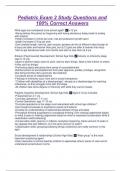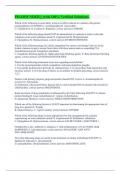Pediatric Exam 2 Study Questions and
100% Correct Answers
What ages are considered to be school aged? ✅6-12 yrs
-Wong defines this period as 'beginning with losing deciduous (baby) teeth & ending
with puberty'
-Height increases 2 inches per year, has pre-pubescent growth spurt
-weight increases 2-3 kg per year
-Gain skeletal length, lose fat, gain muscle: genders do this at different rates though-at
6 boys are taller and heavier than girls, but at 12 girls are taller & heavier than boys
*start to get deciduous teeth at 6 months and start to lose them at 6 yrs.
Erikson (Psychosocial) Development: School Age Kids ✅Industry vs Inferiority stage
(age 5-12 yrs)
-eager to perform tasks (want to work, want to learn things. Start to feel inferior to others
if they can't do things)
-Performing tasks well gives them sense of accomplishment
-Reinforcement of accomplishment from peer approval, grades, privilege, recognition
(like being told they did a good job, like trophies)
-Increased sense of independence
-Feelings of inferiority occur from self or social interactions
-*Children with disabilities at a disadvantage*: already at a disadvantage for reaching
milestones, so they struggle more with this stage
-All children feel some degree of inferiority with skills they cannot master
Piaget's Cognitive Development: School Age Kids ✅Ages 6-12 yrs includes:
-Preoperational: 2-7 yrs
-Concrete operations: 7-11 yrs
-Formal Operations: age 11-15 yrs
*Concrete operations is the stage most associated with school age children:*
-Use thought processes to experience events and actions
-Develop an understanding of relationships between things and ideas
-Perceptual thinking progresses to conceptual thinking: from making judgements based
on what is seen to making judgements based on what is reasoned (conservation skills &
classification skills/collecting)
-Conservation skills: good ex in txtbook: analytical reasoning. Same amount of water in
two glasses that look different. Is it the same amount of water?
-Classification skills: grouping/collecting things (collections are really common in this
age)
Social development & relationships (School Age Kids) ✅*Peer group* is the most
important socializing agent:
-Daily interaction at school teaches children to appreciate others' points of view and to
understand social/cultural norms
,-Peer groups give children information about belonging to groups/cultures (standards for
acceptance and rejection): children may take on 'roles' for acceptance (class clown,
mean girl)
-Also teach dominance, leadership, authority: needed for gaining independence from
parents; increasing independence from parents is the *primary goal* of the school aged
child
-School aged children form groups or clubs
-Early in childhood groups are fluid and loosely organized, but with age comes rigid
rules, exclusivity & conformity
-Having 1 'best friend' is common
Notes:
-Peer groups outside of school are really important, shows them how to act in dif
situations, how to dress, etc.
-Going to a friend's house after school, having sleepovers on weekends, helps them
gain independence, become comfortable being away from family.
Play & Developing Self Concept (School Age Kid) ✅-School-age play involves physical
skill, intellectual skill, rules & rituals
-team play is important for teaching group goals & division of labor, also gives sense of
belonging with rules & teammates
-Quiet, solitary activities usually consist of collecting items and creative skills
*Self-concept develops in these years (perception of abilities, values, appearances):*
-Significant adults help child shape this (parents first, then teachers, then coaches,
church leaders)
-Positive self-concept leads to feelings of self-respect, self-confidence & happiness
Notes:
-organized sports; teams
-creative thinking, computer games (talking through headsets, or working with others in
video games)
-other adults in life become super influential
Body image & concerns r/t growth & development (School Aged Kids) ✅*Children like
their physical selves less as they grow older:*
-The head is the most important part of a school age child's perception of themselves
(school age kids are worried about their facial structures/face not worried about their
bodies yet)
-Body image is influenced by significant others (Family significant adults, peers)
-Increased awareness of 'differences' may influence feelings of inferiority
*School is a huge part of school-age children's lives:*
-Increases child's independence from parents/family
-Teachers become significant adults, children seek approval from them
-Parents supplement school programs (support or inhibit children from meeting school
goals)
-Spend a lot of time at school, and it can cause a lot of stress and stress can come out
in terms of anxiety, school aversion, constipation, emotional reactions (getting in trouble
at school)
,*Discipline and limit setting should instruct & guide positive behaviors:*
-strategies include withholding privileges, imposing penalties, contracting
*The school environment can cause stress & fear:*
-Parents/adults to need to help identify & explore causes
*Big causes of fear in this age are death, being hurt (need reassurance)*
-These kids worry about their parents dying while they're not with them and getting hurt
is also a big fear (they think when they get hurt its definite/final)
Nutrition, Sleep, & Exercise (School Aged kids) ✅*Nutrition:*
-Food likes & dislikes identified in preschool age continue
-Food choices in the home setting are depending on parent choices, while food choices
in the school setting are under child's control
-Might be more open to trying new food, but they'll stick with what they like; strong food
preferences
-Kids start to make their own food choices b/c can prepare snacks for themselves, can
pick out what to order at lunch, etc.
*Sleep:*
-Need an average of 9.5 hrs/night
-Younger school-age children have bedtime resistance, this decreases with age
*Exercise:*
-Children like to increase their skills and enjoy team competitions
-Usually kids enjoy exercising
Sex Education & School Health ✅-Child's attitude about sex is established at an early
age
-Parent reluctance to discuss may lead to idea of sex being 'dirty' & gaining
misinformation from peers
*School age is the ideal time for formal sex education:*
-Normal part of growth and development
-Average age of puberty is 10 yrs in girls and 12 yrs in boys
-Honest but age appropriate answers
-Life span approach
-Information of sexual maturity and the process of reproduction
-Effective communication with parents
*Child's health is ultimately the responsibility of the parent:*
-Parent is still the primary person to manage their kids health
-Schools/teachers assist in educating about health and supporting child's health
-School nurses are vital for:
1. Educating children on health issues
2. Identifying current developmental or health problems
3. Providing care that is needed
4. Managing/educating teachers regarding infections and emergencies
5. Coordinating care with parents, emergency departments, primary care, specialists
Injury Prevention & Anticipatory Family Guidance ✅*Injury Prevention:*
, -Most common cause of severe injury & death in school-age children is motor vehicle
crashes (pedestrian and passenger)
-Most injuries near home or school
-Education is most effective at preventing injuries; really important in preschool years to
reinforce importance of wearing helmets, seatbelts, how to cross street, etc. (also fire
injuries and firearm injuries)
-Bicycle injuries; benefits of bike helmets: falls from bikes cause many head injuries
-Appropriate safety equipment for all sports
*Anticipatory family guidance:*
-Parents adjust to the child's increasing independence
-Parents provide support as unobtrusively as possible
-Child moves from narrow family relationships to a broader world of relationships
-Parents have to understand that kids are supposed to become more independent.
Parents should guide them so they can make good decisions
Enuresis (school aged kids) ✅-Incontinence or night time bed wetting in a child who
should have developed full continence (NOT due to medication or medical condition)
-More common in boys (may be familial)
-Usually ceases between 6 and 8 years of age
*Diagnosis:*
-Chronologic or developmental age over 5 yrs
-Two times per week or more for 3 months
-May have urgency or frequency
-Physiologic causes (diabetes mellitus and UTI) are initially sought; usually rule out
medical causes first
*Primary enuresis:* onset of wetting in children who have never been dry for extended
periods of time
*Secondary enuresis:* onset of wetting after established urinary continence
*Monosymptomatic enuresis:* most common; dry during the day
*Polysymptomatic enuresis:* daytime urgency
Treatment of Enuresis (School Aged Kids) ✅*First line treatment:*
-Bladder training: regular voiding, voiding before bed
-Fluid restriction in evenings
-Interruption of sleep to void: parents wake up child before they go to bed or set alarm in
the middle of the night to wake up child
-Condition reflex response device: bed wetting alarms, wake child up when bed is wet
*Second line treatment:* Drugs
-Desmopressin (DDAVP): 1st line med for nocturnal; similar to vasopressin, inhibits
filtration of fluid at the kidney; Recommended oral versus nasal spray (hyponatremia);
this is the important med to know
-Imipramine (Tofranil): tricyclic antidepressant, has anticholinergic action on the bladder
to inhibit voiding; Relapse is common when medication is stopped (given for up to 8
weeks, then tapered off over 4 weeks)
-Oxybutynin (Ditropan): anticholinergic/antispasmotic: inhibits smooth muscle
constriction of the bladder





